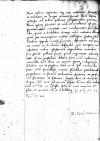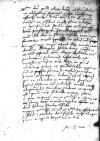⌊⌋ XI huius a Vestra Reverendissima Dominatione ad me datas, per amanuensem et sua manu scriptas, accepi. Sperassem ante earundem aperturam aliquid recreationis suscepturum adscribed in place of crossed-out s⌈smm adscribed in place of crossed-out s⌉, nam alias audiveram certo propalatum esse ⌊regem Romanorum⌋ ex ⌊ducatu Wirtenbergensi⌋ totaliter expulsum et dominia hereditaria sua usque ad Athesim per ⌊lantgrabium Hassiae⌋ et ⌊ducem introductum Wirtenbergensem⌋ depopulata ac nonnulla castra oppidaque intercepta esse. Item et illustrissimum ducem ⌊Philippum Bavariae⌋ cum multis aliis magnis capitaneis captum et in vinculis detineri. Item quod et ⌊Bohemi⌋ adversus ipsum, eorum regem, conspiraverint. Det Deus, quod praemissa a veritate sint aliena, sed metuo, quod magis veritatis quam vanitatis in se habent. Aiunt etiam ipsum regem magna pecuniarum egestate laborare, quae bellorum instructiones et subsidia esse solent. Si ita est, iuvat eum Deus.
Statum ⌊Lubecensium⌋, in quo nunc versatur cardine, ex suo familiari et amicis suis e ⌊Gedano⌋ illustrissimi ⌊ducis⌋que litteris indubie intelliget. Ad ⌊conventum Graudenicensem⌋ animus mihi est proficiscendi, si modo illic a pestilentiali contagione locus purus et non contaminatus fuerit, de quo Vestra Reverendissima Dominatio, quia in propinquo habitat, me tempori avisare velit, precor.
Misimus nuper nuntium nostrum ad Vestram Reverendissimam Dominationem et alios, quo innotui litteris regiis ipsius ⌊maiestatis r(egiae) adscribed⌈r(egiae)r(egiae) adscribed⌉⌋ adversam veletudinem. Quoniam de post nil aliud audivi, bona me fovet spes, quod in totum sit sua ⌊maiestas⌋  AAWO, AB, D. 8, f. 24v bene valens restituta, utque eam valentem, florentem et validam in longos annos servet ⌊Iesus Christus⌋, extensis ad sidera palmis, Omnipotentem precor. Nam ⌊ipsius⌋ sanitas et nostra, et multorum est prosperitas. Eram adscribed⌈EramEram adscribed⌉ ea novitate non mediocriter perculsus ideo, quia a subditis etiam nostris metuere debemus, cum per universum ratione ecclesiastici status saecularibus oppido invisi sumus. Destinavi ad amicos meos in ⌊Culmensi districtu⌋, qui tempore necessitatis nobis assistentiam stipulatis manibus sua sponte polliciti sunt, quid ingruente adversitate ab eis praestolari debeam scire. Nunc valeamus, concedat autem Deus, ne eorum opera indigeamus. Solatur me et se ipsam Vestra Reverendissima Dominatio, quod navicula Petri nunc procellosis maris fluctibus periclitans written over ...⌈... illegible⌈...... illegible⌉ss written over ...⌉, propediem in securum reducetur portum ac pristinum honorem et statum. Faxit Deus, ut ita fiet, de quo nostro aevo plurimum haesito. Cum his valeat Vestra Reverendissima Dominatio in Christo optime, mei memor, ut solet, et amans.
AAWO, AB, D. 8, f. 24v bene valens restituta, utque eam valentem, florentem et validam in longos annos servet ⌊Iesus Christus⌋, extensis ad sidera palmis, Omnipotentem precor. Nam ⌊ipsius⌋ sanitas et nostra, et multorum est prosperitas. Eram adscribed⌈EramEram adscribed⌉ ea novitate non mediocriter perculsus ideo, quia a subditis etiam nostris metuere debemus, cum per universum ratione ecclesiastici status saecularibus oppido invisi sumus. Destinavi ad amicos meos in ⌊Culmensi districtu⌋, qui tempore necessitatis nobis assistentiam stipulatis manibus sua sponte polliciti sunt, quid ingruente adversitate ab eis praestolari debeam scire. Nunc valeamus, concedat autem Deus, ne eorum opera indigeamus. Solatur me et se ipsam Vestra Reverendissima Dominatio, quod navicula Petri nunc procellosis maris fluctibus periclitans written over ...⌈... illegible⌈...... illegible⌉ss written over ...⌉, propediem in securum reducetur portum ac pristinum honorem et statum. Faxit Deus, ut ita fiet, de quo nostro aevo plurimum haesito. Cum his valeat Vestra Reverendissima Dominatio in Christo optime, mei memor, ut solet, et amans.
 AAWO, AB, D. 8, f. 24r
Reverendissime Domine, cum alias litteras ad finem scriberem ac obsigillare statuerem, rediit nuntius meus, afferens mihi litteras Vestrae Reverendissimae Dominationis, quibus mentem et consilium eiusdem plane intellexi et hoc ipsum, uti scribit, ego etiam priusquam litteras perstringerem, praemeditatus sum, cum autem illi duo in praeterito insultu rusticorum sinceriter mecum egerunt, et odium ecclesiasticorum nunc on the margin⌈nuncnunc on the margin⌉ magis atque magis apud illos increbuerit, decrevi dumtaxat habita bona occasione et nunc experiri animum illorum. Distantia enim praelatorum Polonorum, visum mihi est, necessitatis tempore nimis longa et quid celeritas potest, et quantum valet, expertus sum et possum plures in medium principes ponere et praecipue ⌊Lubicensium⌋ exulem episcopum qui ea celeritate et invasione impetum hostium sustinere non valuerat, malim itaque aliquantulum timidus iudicari et cautus esse, quam nimis fidendo incautus obrui, a quo eripiat me et Reverendissimam Dominationem Vestram Omnipotens, ut autem simus omnem in eventum vigiles consulo et Deum habeamus prae oculis, consulo.
AAWO, AB, D. 8, f. 24r
Reverendissime Domine, cum alias litteras ad finem scriberem ac obsigillare statuerem, rediit nuntius meus, afferens mihi litteras Vestrae Reverendissimae Dominationis, quibus mentem et consilium eiusdem plane intellexi et hoc ipsum, uti scribit, ego etiam priusquam litteras perstringerem, praemeditatus sum, cum autem illi duo in praeterito insultu rusticorum sinceriter mecum egerunt, et odium ecclesiasticorum nunc on the margin⌈nuncnunc on the margin⌉ magis atque magis apud illos increbuerit, decrevi dumtaxat habita bona occasione et nunc experiri animum illorum. Distantia enim praelatorum Polonorum, visum mihi est, necessitatis tempore nimis longa et quid celeritas potest, et quantum valet, expertus sum et possum plures in medium principes ponere et praecipue ⌊Lubicensium⌋ exulem episcopum qui ea celeritate et invasione impetum hostium sustinere non valuerat, malim itaque aliquantulum timidus iudicari et cautus esse, quam nimis fidendo incautus obrui, a quo eripiat me et Reverendissimam Dominationem Vestram Omnipotens, ut autem simus omnem in eventum vigiles consulo et Deum habeamus prae oculis, consulo.
Rogatu reverendissimi ⌊episcopi Cracoviensis⌋ et Reverendissimae Dominationis Vestrae assistentiam possibilem praebebo domino ⌊Fasolt⌋, mihi alioqui plane incognito.
Dat(ae) or Dat(um)⌈Dat(ae)Dat(ae) or Dat(um)⌉
, ut in litteris.
⌊Mauritius episcopus Varmiensis⌋
 AAWO, AB, D. 8, f. 24v bene valens restituta, utque eam valentem, florentem et validam in longos annos servet
AAWO, AB, D. 8, f. 24v bene valens restituta, utque eam valentem, florentem et validam in longos annos servet  AAWO, AB, D. 8, f. 24r
Reverendissime Domine, cum alias litteras ad finem scriberem ac obsigillare statuerem, rediit nuntius meus, afferens mihi litteras Vestrae Reverendissimae Dominationis, quibus mentem et consilium eiusdem plane intellexi et hoc ipsum, uti scribit, ego etiam priusquam litteras perstringerem, praemeditatus sum, cum autem illi duo in praeterito insultu rusticorum sinceriter mecum egerunt, et odium ecclesiasticorum nunc on the margin⌈nuncnunc on the margin⌉ magis atque magis apud illos increbuerit, decrevi dumtaxat habita bona occasione et nunc experiri animum illorum. Distantia enim praelatorum Polonorum, visum mihi est, necessitatis tempore nimis longa et quid celeritas potest, et quantum valet, expertus sum et possum plures in medium principes ponere et praecipue
AAWO, AB, D. 8, f. 24r
Reverendissime Domine, cum alias litteras ad finem scriberem ac obsigillare statuerem, rediit nuntius meus, afferens mihi litteras Vestrae Reverendissimae Dominationis, quibus mentem et consilium eiusdem plane intellexi et hoc ipsum, uti scribit, ego etiam priusquam litteras perstringerem, praemeditatus sum, cum autem illi duo in praeterito insultu rusticorum sinceriter mecum egerunt, et odium ecclesiasticorum nunc on the margin⌈nuncnunc on the margin⌉ magis atque magis apud illos increbuerit, decrevi dumtaxat habita bona occasione et nunc experiri animum illorum. Distantia enim praelatorum Polonorum, visum mihi est, necessitatis tempore nimis longa et quid celeritas potest, et quantum valet, expertus sum et possum plures in medium principes ponere et praecipue 


